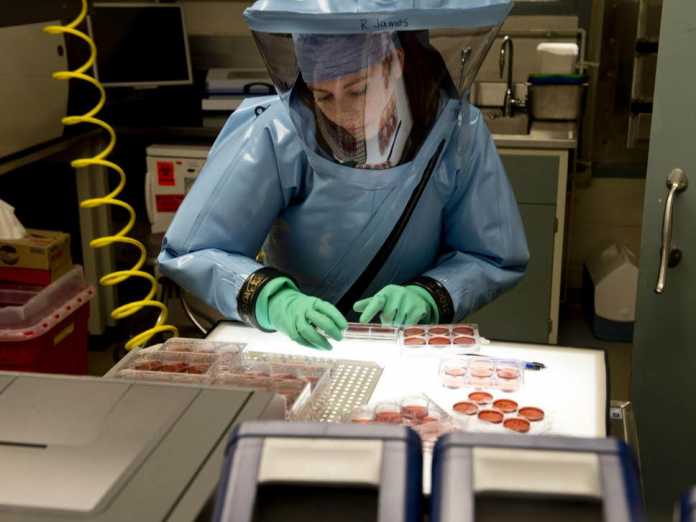
Scientists have made major breakthroughs in the search for effective and safe vaccines for the dreaded coronavirus (COVID-19).
Medicago has announced significant steps forward in developing a vaccine for coronavirus even as the National Institute of Allergy and Infectious Diseases (NIAID) said a novel coronavirus vaccine trial in the United States (US) has now given a dose to its first participant.
Medicago, a biopharmaceutical company headquartered in Quebec City, Canada, announced that they have successfully produced a Virus-Like Particle (VLP) of the coronavirus just 20 days after obtaining the Severe Acute Respiratory Syndrome Coronavirus type 2 (SARS-CoV-2)/virus causing the COVID-19 disease gene.
Production of the VLP is the first step in developing a vaccine for COVID-19, which will now undergo preclinical testing for safety and efficacy. Once this is completed, Medicago expects to discuss with the appropriate Health Agencies to initiate human trials of the vaccine by summer (July/August) 2020.
The company is partially owned by Philip Morris International and is part of the tobacco company’s new course based on science, technology and innovation.
Philip Morris International (PMI) acquired a stake in Medicago in 2013, and currently holds approximately 30 per cent of the company’s shares. Mitsubishi Tanade Pharma owns the majority of the company’s remaining shares.
PMI’s participation in Medicago is part of the company’s overall efforts to explore further science and technology-based avenues for its future business.
Science and innovation became key competencies for PMI as it announced its ambition to replace cigarettes as soon as possible with science-based smoke-free alternatives. The skills, capabilities and business partner networks that have been built over the last decade allow the company to explore new opportunities as it transforms its business away from cigarettes.
Medicago’s first product, a seasonal flu vaccine [Recombinant Quadrivalent Virus-Like Particle (QVLP)], is presently under review by Health Canada. Vaccine candidates for pandemic flu, rotavirus and norovirus are being tested across pre-clinical and Phase II clinical trials. Medicago is also developing antibodies against hMPV, RSV and opioids.
As explained in this story, the company does not use eggs—like most companies— but plants such as tobacco as a basis for vaccines.
Traditional vaccine production requires eggs, a lot of them. Vaccine manufacturers inject the virus into the eggs, where it propagates. But using eggs is expensive, takes a long time, and is far from perfect. Mutations can yield vaccines that don’t match up to the virus they aim to shut down.
So Medicago does not work with a live virus. Instead, it uses plants, a relatively new approach that has seen much advancement in the past decade. It inserts a genetic sequence into agrobacterium, a soil bacteria, which is taken up by plants—in this case, a close cousin to tobacco. The plant begins to produce the protein that can then be used as a vaccine. If the virus begins to mutate, as is expected for COVID-19, they can just update the production using new plants.
“That is the difference between us and egg-based methods. We go directly to producing the vaccine or the antibody without having to propagate the virus.”
Meanwhile, a novel coronavirus vaccine trial in the US has now given a dose to its first participant, the NIAID announced Monday.
The study aims to enroll a total of 45 healthy adults over a six-week time frame. Each participant will receive two injections about a month apart in varying doses.
There is currently no vaccine for coronavirus, which has spread to 4,477 reported cases across 49 states, Puerto Rico, the US Virgin Islands and the District of Columbia. At least 87 people have died.
The study, which is a Phase I trial, is meant to establish that the vaccine is safe and induces the desired response from participants’ immune systems. Proving that the vaccine is effective in preventing COVID-19 infection, however, will require follow-up studies involving many more participants, which will take many more months, experts say.
“Finding a safe and effective vaccine to prevent infection with (the novel coronavirus) is an urgent public health priority,” NIAID Director Dr. Anthony Fauci said in a statement Monday. “This Phase 1 study, launched in record speed, is an important first step toward achieving that goal.”
The trial is funded by NIAID and run out of the Kaiser Permanente Washington Health Research Institute in Seattle.
The vaccine, which uses genetic material called messenger RNA, was developed by NIAID scientists in collaboration with the biotech company Moderna.
The agency credited the speed with which it stood up a Phase I trial to its prior studies on related coronaviruses Severe Acute Respiratory Syndrome (SARS) and Middle East Respiratory Syndrome (MERS). Scientists had previously worked on an experimental MERS vaccine targeting a protein on the virus’ surface, which gave them a “head start for developing a vaccine candidate to protect against Covid-19,” the statement said.
In the time it will take for a vaccine to go through its trials, the Centers for Disease Control and Prevention says the most effective precautions are thorough hand washing and social distancing practices that limit gathering in large groups.
Kindly contact us @ Naijalivetv@gmail.com
Call or Whatsapp: 07035262029, 07016666694, 08129340000










